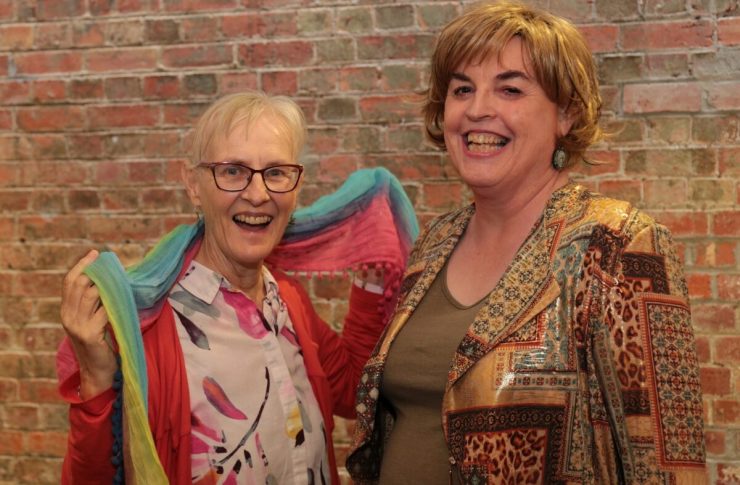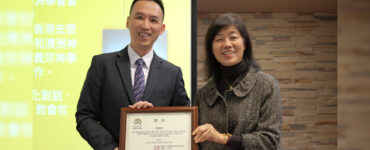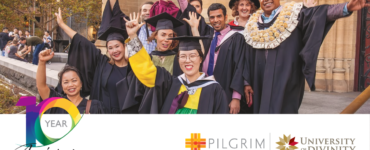This article was originally published by Crosslight, and has been republished here with permission.
By Andrew Humphries
It’s no understatement to say Josephine Inkpin knows a thing or two about change, in both a physical and spiritual sense.
Until 2017, Josephine had been assumed to be male, married to wife Penny and the father of twins.
The pair are still married and so strong is their relationship that in 2020 they renewed their wedding vows to mark 35 years of marriage.
The difference this time was that Jonathan renewed those vows as a female, after her decision three years earlier to transition to a woman.
Josephine is Minister at Pitt Street Uniting Church in Sydney and, last month, she and Penny, an Anglican priest, led what they believe was the first queer theology course in Australia.
As the first transgender Minister in any mainstream Australian church, Josephine drew on her own experiences when she and Penny led students through the intensive five-day course at Melbourne’s Pilgrim Theological College.
“A lot of work has been done in queer spaces and sexually and gender diverse people in general and over the last few decades there has been a growth in deliberate engaged queer theology in places like the US and the UK, but in Australia we are catching up a bit with that,” Josephine says.
“This was, as we understand, the first intentional course of queer theology in Australia and it’s a step in a journey that has already been taken in many places in the world.
“It’s a journey the Uniting Church is also on and I think it’s wonderful what Pilgrim is doing, reflecting the transformational thing that is happening in society in a positive way.”
Josephine hoped the course signaled a change in the conversation around how the church, and wider society, views queer and transgender people.
Above all, she and Penny wanted it to lay the foundations for students, many of whom will go on to fill pastoral roles within the Uniting Church, to view queer and transgender people through a prism of positivity.
“In a way it’s shifting from sexuality and gender diversity being a problem or a challenge to an invitation about how we engage with this in a positive way,” Josephine says.
“(It’s about) what can we learn and grow and how does that enrich us and how do we flourish within it, both for those who are sexually and gender diverse, but also the wider body of the church and, indeed, the world.
“So it’s shifting the thinking about what was traditionally in queer theology something apologetic … to something more celebratory.
“Welcoming all to the table is certainly where the Uniting Church sits (and so we’re now exploring) whether we have reached the point of actually conversing and listening to sexually and gender diverse people and asking what is the food that they bring that can enrich that meal, so to speak.”

Josephine says the course was about engaging with sexuality and gender diversity in a positive way.
Josephine and Penny explored how the Bible actually speaks to queer people and its importance to them in terms of faith.
The course, they say, allowed students to cast a “queer eye on the Bible”.
“That was such an important part of the course and, from a personal perspective, one of the things that kept me alive in the days when I wasn’t myself fully, was my faith,” Josephine says.
“It’s a two-edged sword. Certainly historical faith has been constricting to gay people, and still is to transgender people because there is a lot of transphobic and homophobic elements in religion.
“The other side of it is that because God is beyond sex and gender, it was the one space when I was young where I could be freer.
“The heart of faith is sharing in a mystery and relationship that is beyond any human formulation, for God is more than that.
“For me, God was never a problem … I was ashamed because I thought I was hiding something from God but eventually it dawned on me after a long time that God loves me just as I am, so I should love myself just as I am.”
Informing the course content was the belief that at the heart of the Bible lies a message about liberation.
“For me the Bible is not (only) about sin and judgment, although they are key things, it’s about liberation,” Josephine says.
“So if the core event of the Hebrew scriptures is about the liberation of the slaves and the marginalised, and Jesus breaking down boundaries and talking about love being the centre of things and having the fruits of the spirit, that is what queer people embrace.
“When women started reading the Bible with female eyes, the stories were read in a different way and when you put a ‘queer eye on the Bible’, you start to see things that you didn’t before.
“As an example, when Jesus is setting up for the Last Supper and he says to one of the disciples, ‘go into the city and find a man with a water jar’, most of the time we pass over that reference, but then when you think about it and put transgender eyes on it you go, hang on a minute, a man carrying a water jar in those days would have been very unusual.
“So there were obviously queer people in the Bible and Jesus would have mixed with them (and) there are lots of stories that we are starting to see (through the lens of queer theory).
“The Gospel is about transformation and maybe that is why transgender people can be a bit of a challenge to the rest of the world, because we change from one thing to another and some people don’t like the idea of change, but it’s a fundamental part of the Gospel about becoming something more than you are.”
Penny takes up Josephine’s theme about liberation and suggests reading the Bible with fresh eyes opens up endless possibilities.
“It’s about the whole Bible, and the balance of the text is about liberation and love and it’s not about certain specific texts,” she says.
“The church has become obsessed with a very small number of individual texts and failed to look at the whole, and one of the thrilling things is that when you begin to bring a queer eye to the Bible you discover that queer people are everywhere in the Biblical narrative, hiding in plain sight.”

Josephine and Penny at Pitt Street Uniting Church in Sydney.
Queer theory in theology simply represents a different way of looking at and engaging with the Bible, says Josephine.
“It asks us to look at some of these stories and question our assumptions and to look at it with a fresh slant and then we see new things,” she says.
“I think some conservative thinkers feel that queer people are coming along and trying to impose our own idea as the orthodoxy, but queer theology isn’t trying to replace anything, it’s just saying this is another way of reading the Bible.
“And I think, in that sense, for transgender people the time has come to become more visible, not only for ourselves but for the greater good.”
That increased visibility for queer and transgender people will only come through much work from religious bodies like the Uniting Church and, in that regard, Josephine is buoyed by its commitment to the cause and what something like a course on queer theology might achieve.
“I think what Pilgrim is trying to do with this course is ask, ‘can we help queer people offer their gift to the church and can we joyfully receive it and celebrate it?’,” she says.
“So when we have something like the Trans Day of Visibility, can the church be there with us?
“It’s about empowering more queer people in our churches, not just for them but for everybody.
“The space that we have in the Uniting Church to be creative about all of this is fabulous, as long as we seize the opportunities.
“Action and art have played a role in queer liberation, whether something like the Stonewall Riot or a piece of queer art, and so the course will engage with these sorts of things and explore how you look at queer theology through art to convey meaning.”
As a more progressive church, Josephine says the Uniting Church is starting from a position of some strength when embracing gay and transgender rights.
“Yes, that is definitely the case,” she says.
“In Sydney, Pitt Street has been a bit of a lighthouse on issues around this that have been emerging and therefore can open up space for the church to be able to engage more thoroughly.
“My predecessors at Pitt Street broke open that space and it’s wonderful being in a community that is not just 100 per cent welcoming and affirmative, but also celebrates and empowers people, which is where we need to get to on this.
“It’s great that the Uniting Church is positioned to continue moving forward, whereas other churches are still fighting some old battles.
“(It’s about) understanding that the Uniting Church is a diverse community and there will be people at different stages of the journey, but if we are serious about being pilgrims on the way we have to keep moving, and this is one area in which we can do that.
“For me, it’s wonderful being in Pitt Street. The Uniting Church is being invited again to be a leader, in the same way it has been with an issue like interfaith, which was an issue 10 or 20 years ago.”

Penny is grateful that the Uniting Church is leading the way on issues of sexuality and gender diversity.
And as the Uniting Church begins to lead on the issue, Penny says the journey towards acceptance becomes easier to navigate.
“That journey isn’t being resisted and that is fantastic,” she says.
“The course we did also represents an important step in that a gift was being offered and a call was being recognised.”
Josephine says Uniting Church leaders like President Sharon Hollis continue to carry the issue of gay and transgender respect and rights forward in a positive way.
“We’re seeing that positivity on this issue at a leadership level within the Church,” she says.
“Yes there is more work to be done, but we see, for example, more proactive work by the leadership in terms of making (their opposition clear to) religious discrimination and through providing evidence to parliamentary inquiries.
“I think they are steps on which we can build. We are on the first step of the journey, but there is still a lot more to do.
“The reality at times, though, is that a section of Australian society is less than open to having this conversation.
“The last few months have been really grueling around this debate over transgender rights and sport, often fueled by right-wing religion, so this is about how do we interact so that we are seriously talking and listening to one another and working through the issues.”
It doesn’t mean, though, that more support from the Uniting Church wouldn’t be welcomed, particularly for Josephine as its first transgender Minister.
“As a Minister it’s been difficult because you have your own job and placement and, as the only transgender Minister in the Uniting Church, I get a lot of pastoral requests, so it’s almost like I have this other job that the church is yet to see that it needs to resource,” she says.
“The Uniting Church has been very kind and supportive of me, but there is work that it needs to do because it currently has a relatively low level of understanding around transgender issues and how we help people.
“We’re hoping for ongoing support from the church to talk about what we need and some of the changes that need to happen.”
As Australia’s first transgender Minister, Josephine has watched on as the debate around religious discrimination has been used by some people to attack those in the LGBTQI community.
And as the debate has raged, Josephine recognises that she and the Uniting Church have a real role to play in restoring a sense of calm.
“You know, we disagree in the church community about all sorts of things and one of the saddest things is that sexual and gender diversity becomes such a hard line, which is difficult,” she says.
“I think the problem around the religious discrimination legislation is that it has moved from recognising people’s religious identity and our diversity of understanding into something where our differences can be used to exclude other people.
“My view is, ‘let’s let many flowers grow’ and for transgender people it’s saying ‘can the Uniting Church not only let us be here, but let us flower in a way that also allows all parts of the church to have space to grow?’.”

Josephine and Penny conduct worship at Pitt Street Uniting Church.
For Penny, the discrimination many in the LGBTQI community have suffered mirrors her own experience within the Church of England in the United Kingdom many years ago, as the right to ordination for women like her became a polarising issue.
“I experienced a vocation towards the priesthood over 40 years ago and went through all of the ghastly debates in the Synods of the Anglican Church, when church fathers were quoted as saying that ‘women are the mouth of the devil’ and all of that sort of stuff,” Penny says.
“Eventually I was made a deaconess, then a deacon and then a priest, and I see with queer theology much the same trajectory we have gone through with feminist theology, that it comes in from the margin (and is then) gradually received.”
While it would take many years before she came out, a lightbulb moment around what might be possible occurred for Josephine just before she and Penny emigrated to Australia in 2001.
“Just before we moved here from the UK, the first transgender priest came out there and I remember being transfixed at that, recalling that very moment where I thought ‘I am possible’, and I had never been able to imagine that previously,” Josephine says.
“It was getting harder to cope with everything, but I think if we had stayed in the UK I would have come out earlier, much earlier than in Australia where the Christian culture is much more conservative.”
Josephine and Penny both served the Anglican Church in Australia for many years after their 2001 arrival and, in 2017, Josephine felt comfortable enough to declare to her community that she was a transgender woman.
“In one sense, coming out was a leap of faith but, at the end of the day, you can’t live in hiding, and in that sense the story of Lazarus comes to mind,” Josephine says.
“That story can be read through a queer lens as Jesus asks him to ‘come out’ and he says ‘untie them’ and, to me, that is the job of the church, to allow gay and transgender people to come out and to unburden themselves. In other words, let them go.”
Josephine knew, though, that coming out as a transgender woman within the Anglican Church was likely to come at a great personal cost.
“When I couldn’t deal with it any more I rang a counsellor based in Melbourne and they gave me much more time than I thought they would and I said to them, ‘I can’t do this because I will lose everything and Penny will probably be sacked (as an Anglican priest) because she is married to me’,” Josephine recalls.
“I said to the counsellor, ‘we will lose our house, our friendships, and other things we couldn’t imagine’, and the counsellor said to me ‘do you think you’re over-exaggerating, don’t you think there will be some people in your parish who are supportive?’
“And then I thought, ‘yes, there are some who will be, but it will still cause divisions’.
“It’s quite surprising, though, how many people are supportive and willing to travel with you even if they don’t know anything about what you are dealing with (as a trans person), so people don’t feel that they have to hide and live with that shame.”

Josephine feels very fortunate to be part of such a progressive and caring congregation at Pitt Street.
Penny recalls vividly the meeting she and Josephine had with the Anglican Church leadership to discuss Josephine’s coming out.
“We went to them to tell them about Josephine’s need to transition and I can remember her prefacing the conversation by saying, ‘I have to share with you an inconvenient truth’, and we went in knowing that we might be told there is no place for us any more,” she recalls.
“Before the meeting I can remember praying in the cathedral in Brisbane, and it was the most beautiful moment because I looked up at one of the windows and it had an image of a phoenix on it and the word ‘courage’ below it, and I had that sense that the Spirit is in this and we have to take that step forward.
“But yes, at the time our future was on the line.”
While there was a good level of understanding from the Brisbane Anglican leadership around Josephine’s situation, in contrast the Sydney Diocese’s 2019 Doctrine Statement on Gender Identity made it clear where it stood on the issue.
”The Bible never endorses a divergence between biological sex and gender identity or expression,” the doctrine states.
“Blurring the distinctions between male and female, or seeking to present one’s sex as contrary to one’s biology is an attempt at self-creation that involves a denial of the biologically-sexed body God has given to us.”
As she considered her future, it was the more progressive Uniting Church that offered Josephine a sense of place.
And, in Pitt Street, she found the perfect faith community, one she could stand before and declare proudly, “my name is Josephine Inkpin and I am Australia’s first transgender Minister”.
“My induction at Pitt Street was such a big thing because we had such a large group of transgender people from supportive organisations there and some of them were in tears, and it was such a joyful occasion because it is so affirming and celebrating when that gift is received,” she says.
“For me it was special, but it was also special for everybody else.
“It has changed my faith in a way but certainly strengthened it, it has shown me that, yes, you need to be gentle and understanding of other people, but don’t let that hold you back going forward and have courage.
“It has been very much a spiritual journey involving Pitt Street, and our move to the Uniting Church also represents transition, of coming into a new space.”

Penny was part of the Church of England in the United Kingdom when the ordination of women became a polarising issue.
Thirty-seven years after they married in the UK, Josephine and Penny say Josephine’s transition has only strengthened their relationship.
“Oh yes, very much so, and I love the simple things about it … if you are able to love yourself more deeply you are better able to love other people,” Josephine says.
And that, says Penny, is at the heart of their “new” relationship.
“Sometimes not all couples can stay together, but it saddens me when I talk to a couple with one member who has transitioned and the wife will say she doesn’t want to hold hands with her wife because they feel, embarrassed, ashamed or awkward,” she says.
“So Josephine and I are going to hold hands in public and kiss when we want to and not care what people think about that.
“We are a married couple in every way and will remain so, but obviously every couple has to negotiate this transition at their own level of confidence and with what is comfortable for both of them.”
Before the course began, Josephine’s hope was that it might pose a few questions and also challenge those taking part.
“We suspect some people taking the course will be queer people and we hope it will be enriching in terms of deepening their own understanding, hoping that some of them will go on to do further research and be leaders in the church and the world,” she says.
“It would be wonderful to see a greater range of people who are informed around all of this.”
And the end result was five days of deep engagement and learning that Josephine and Penny hope will lead to a greater understanding around transgender issues.
“The class was a wonderfully engaged group, with students from the Uniting Church, (as well as) Roman Catholic, Anglican, Salvation Army, Baptist and Pentecostal churches,” Penny says.
“Students came from Western Australia, NSW and Queensland, as well as Victoria (and) some had doctorates, while others came with just the two prerequisite units in theology.
“Some were members of the LGBTIAQ+ community, while others were allies and family members, or simply hungry to challenge themselves and their faith with new knowledge.
“Community formed quickly and the class supported each other in subjecting scripture and doctrine to scrutiny through a queer lens.
“It was a very rewarding time and we look forward to the research projects and further learning that will be generated from this introductory course.”

Josephine’s transition has only strengthened their relationship, the couple say.
And making use of the knowledge gained from the course will be so important, Penny says.
“What this course does is bring some perspectives together and provide a real stimulus and a safe space for people who might take this research and ideas forward at a high academic level in the future,” she says.
“People who are going to exercise a pastoral ministry should at least gain some basic understanding that will inform their practice.
“When Josephine was first exploring coming out we attended an event with a number of transgender people and it was very clear to me that these were people deeply engaged with exploring their identity, which they are forced to do by dint of who they are and for whom little or no spiritual care or provision is being made by mainstream churches or indeed other faiths.
“I was director of formation for the Anglican Church in southern Queensland when Josephine transitioned and, as a consequence, the students in my care at that time came to me and said ‘we need to know about this, we know nothing about this, why is it not on our curriculum’ and so, because we were there, they obviously learned a great deal.
“There is an undoubted need that could be met by properly equipped ministers.
“I think every minister, lay and ordained, needs to have a properly informed understanding and this course is just the beginning of that. It’s about dipping your toe in the water.”
Most of all, says Josephine, it’s about people being as passionate and optimistic as she is about the possibilities that lie ahead.
“I’m passionate about it because I think that it’s one of the gifts of God that we are given at the moment to enrich and transform the church in terms of sexual and gender diversity alongside other things that are easily problematised,” Josephine says.
“Renewal in the church usually comes from the margins and if we see queer people as not problems but assets, through whom God speaks, I think that’s where we find some hope and transformation for the church, which might otherwise struggle to find its place in a world that is struggling with these things.”
“Above all, I want people to know that they are loved, whatever their circumstances and that’s the role of the church, to let people know that they are loved.
“God is there in the midst of our worst circumstances and, even if we are driven to our wit’s end, Jesus Christ is still there and resurrection is possible.
“Our faith gives us another day and when we wake up the sun is breaking through.”







Add comment